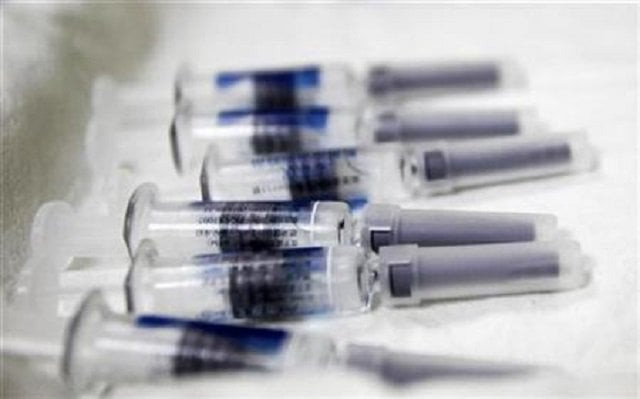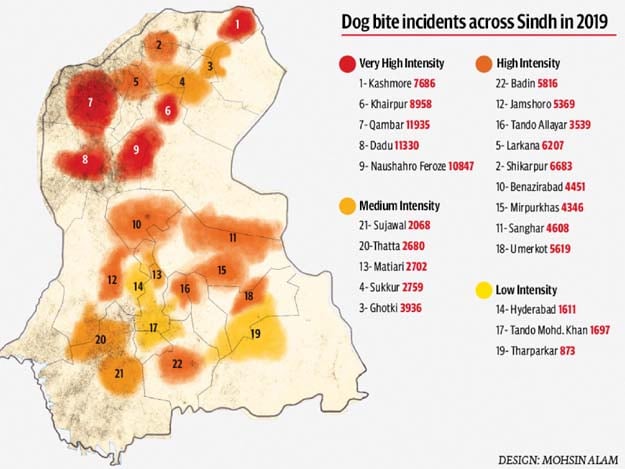Fight continues against preventable nightmare in Sindh
Increased number of dog-bites sends thousands to hospital while several succumb to the deadly disease

PHOTO: REUTERS
From alleys and streets, the din of stray dogs continues to terrorise residents in Sindh where the number of dog-bite cases is soaring. The chorus of their barking is the first warning followed by an attack that lands most victims in a near-death situation.
So far, the large population of free-roaming, unvaccinated canines across the province has sent hundreds of thousands rushing to the nearest hospital to seek medical aid for a dog bite. Only a handful are lucky to receive the appropriate vaccine.
According to the Sindh Health Department Director-General, more than 129,580 dog bite cases have been recorded from different parts of the province between January and August, 2019. To provide adequate treatment for the growing cases, Pakistan requires 0.15 million anti-rabies vaccines (AVR). However, an acute shortage of AVR and almost non-existence of facilities in the rural parts of Sindh have turned the threat of rabies into a health crisis.
“Unvaccinated stray dogs are the main source of the rising cases of rabies in the province,” said a health official, who spoke on the condition of anonymity.
Typhoid vaccines added to routine immunisation programme
The dearth of anti-rabies vaccines coupled with increased dog-bites has claimed up to 12 lives in Sindh, including Karachi. The local government bodies associate the violent spread of rabies to the growing dog population and have resorted to province-wide culling as a counter measure. However, institutions responsible for offering healthcare facilities to the public have continued to stay mum about the epidemic.

Those who have the ill fate of being affected with rabies are primarily administered an ARV vaccine along with antibiotics, tetanus toxoid (TTD), Verorab and Immune globulin intravenous (IGRV), while heavy dosages of painkillers are used to numb the stinging sensation.
“The total expense for treating a dog-bite can cost somewhere around Rs 15,000, but the extreme shortage of the primary vaccine has made things even more difficult,” Dr Seemi Jamali, Executive Director of the Jinnah Postgraduate Medical Centre, told The Express Tribune.
Rabies is a disease carried by mammals like bats, raccoons, coyotes and most prominently, dogs. Rabid animals, which show visible symptoms like twitching, excessive excitability and heightened aggression, can infect humans through a scratch or bite.
EPI to pay parents to get children vaccinated
Once infected, symptoms of Rabies may start to manifest approximately six weeks after a bite from a rabid animal. Symptoms include high fever, shivers, headache, sore limbs and then a torturous condition called hydrophobia, where the patient starts choking at even the thought of drinking water. The virus after transferring into the muscles of the human body makes its way to the nervous system and renders the vital organs useless one after another until the infected ceases to exist. If the virus reaches the salivary glands, it holds the risk of spreading from one infected person to another.
Unlike other diseases, Rabies holds a 100% risk of claiming the infected person’s life if not treated immediately, making timely medical treatment the only means of prevention. In case of a rabid dog-bite, patients are urged to immediately clean the wound with soap and lukewarm water for several minutes and visit a hospital to get anti-rabies vaccines. The patient should also inspect the wound for swelling, soreness, redness or flow of puss and consult their doctor immediately in case of any symptoms even after the treatment.
As one of the most deadly infections, Rabies is responsible for claiming nearly 26,000 to 55,000 lives globally every year. Over 95% of these deaths take place in Asia and Africa. But out of the 150 countries where Rabies is prevalent, only a few produce the required vaccines and the rest like Pakistan are left with no option but to import them from countries like India and China. But the excess of Rabies cases locally have led to India slashing the export to Pakistan creating a nationwide dearth. However, The Government of Pakistan taking notice of the health emergency, has directed the National Institute for Health (NIH) to locally produce the required anti-rabies vaccines.
“We’ll begin working on producing the vaccines from November,” an NIH representative said.
Published in The Express Tribune, October 22nd, 2019.


















COMMENTS
Comments are moderated and generally will be posted if they are on-topic and not abusive.
For more information, please see our Comments FAQ